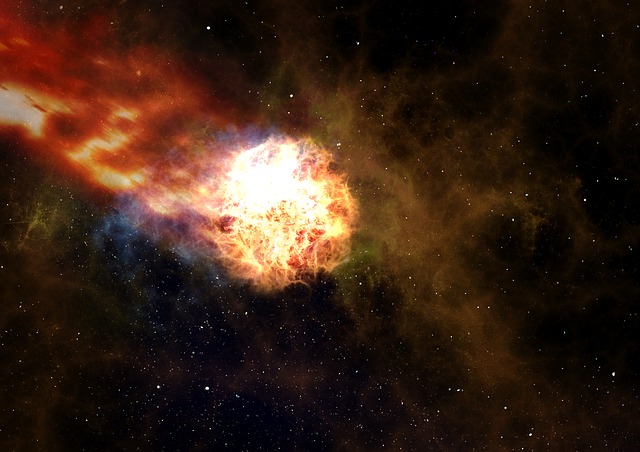Continuing on with “Star-begotten” by H.G. Wells, this week I made it through chapters 2, 3, and 4. Within these chapters, we begin to see the descent of Joseph Davis into what is potentially madness. However, the story is weaved incredibly well, making the entire scenario feel all too possible despite how ludicrous Martian cosmic rays sound. Thus, this week, I feel it is imperative to discuss how the story establishes authority to create believability, and also what the events mean for our modern day. As per usual, the following is just my own opinion on the story.
Chapters 2, 3, and 4 of “Star-begotten” focus on Joseph Davis, the Planetarium Club, and Dr. Holdman Stedding. In chapters 2 and 3, we see Joseph Davis interact with members of the Planetarium Club. While there, Joseph listens to a lecture from an elder gentleman about cosmic rays. In the lecture, the gentleman explains how cosmic rays pass through everything, and that some speculate every once in a while a ray interacts with an atom and changes it. As the lecture wanes, a few members begin to playfully theorize that Martians are slowly “martianizing” humans, using cosmic rays to change humans into Martians. As Joseph leaves the club, he becomes enraptured with the idea and begins to wonder if his wife and child have been affected. In Chapter 4, Joseph meets with Dr. Holdman Stedding, his wife’s doctor. Joseph consults the doctor about his wife and eventually reveals the Martian idea to the doctor. Dr. Stedding at first humors Joseph and ponders over the idea himself. However, he eventually concludes Joseph is delusional and writes Joseph to think no more on it. Unfortunately, Joseph Davis is convinced the doctor does believe him and is just afraid say so, preparing to explore the idea more at the Planetarium Club.

Poor Mars always getting a bad reputation just because of imaginary Martians. Picture courtesy of WikiImages on Pixabay.
From an outsider’s perspective, the idea of Martians using cosmic rays to influence humankind sounds completely ludicrous. Yet, the story does a fantastic job of making the characters’ belief in it seem believable. The primary way the story achieves this is through establishing authority in two different avenues. In the first avenue, the story gives a layman’s term explanation of cosmic rays. While the explanation is not going to win any awards for scientific precision, the explanation has enough scientific jargon to pass inspection. Thus, for those like Joseph and many readers who do not have a background in astronomy, astrophysics, and similar, the explanation is going to seem a correct enough approximation. As such, when cosmic rays are evoked as the cause, it becomes harder to reject as impossible, which is all that needed for the characters’ beliefs to be believable. Additionally so, the story adds extra authority to this facet by evoking the idea that we don’t know everything about science yet. As the story puts it, “yesterday’s joke is tomorrow’s truth.” In so doing, this adds a sense of the character’s being skeptical themselves, which in turn makes their willingness to pursue the idea seem harmless yet fitting for their personalities.
However, there is a second avenue that also aids in establishing this authority: Dr. Stedding. Dr. Stedding is a character who stands as the voice of reason. Much like the reader is thinking, Dr. Stedding is the first to bring up the idea that Joseph is suffering some delusions. He denotes how typical it is for new fathers to experience this, and as a doctor he has a general sense of wisdom about him. All in all, Dr. Stedding is portrayed as someone who is sane, logical, and stable. Thus, when Dr. Stedding himself does not discount the idea entirely, and even entertains the prospects, it once again establishes a smidgen of authority to the idea. Especially in regards to Dr. Stedding’s interactions with Joseph, it is easy to see how Joseph came to so ardently believe in the idea.
In summary, the take away from these tactics is that the story uses them wisely to make the story logical. Both the idea itself and characters like Dr. Stedding add a sense of authority that the idea isn’t impossible. Thus, as Joseph delves further into “madness,” we understand as readers why the progression occurs and why he’d cling to such an unbelievable idea. Since this inspires empathy, it helps us feel for Joseph instead of mock him for his seemingly ridiculous beliefs. All in all, this is a very intelligent execution that allows for the ridiculous and logical to exist in complete harmony. In other words, the story weds the sometimes misguided nature of human enquiry with the facts of science and human progression.

Sadly real cosmic rays are more science than visual marvel, so have a generic space picture. Picture courtesy of geralt on Pixabay.
However, aside from the execution, I feel the story serves as a stark warning about imagination, skepticism, and authority. As seen with Dr. Stedding, even when someone is completely stable, their imaginations can get the better of them. Thus, when something isn’t impossible, there is often a tendency for one to convince themselves that it’s true. As “authority” is added, one becomes even surer of the position and digs in. Unfortunately, as Dr. Stedding realized before it was too late, this can lead to folly and a lack of skepticism. We wind up clinging to false ideas that do not stand up to scrutiny, and as the story shows us, anyone is susceptible to it. Thus, what we see in this story so far is the dangerous power of imagination. Even if our imagination wants to cling to anything not impossible, sometimes we forget to ask about the actual likelihood.
In the end, I hope these chapters remind us all of one thing: verify the things you hear. Facts from the same source aren’t always accurate, and just because we trust someone doesn’t mean they’re right. Skepticism is essential when trying to scientifically understand the world, because otherwise we run off and apply ideas that may just be wrong and hurt others. However, at the end only time will tell in this particular story if Joseph is right or if delusions drive him family away.
